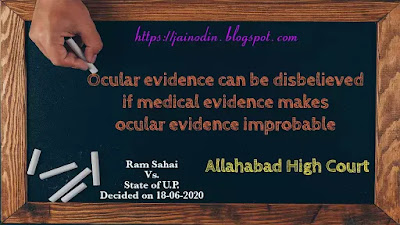Master Krishna Akhade (PW-4), son of deceased Sangita and the appellant -accused, was 4 year old tender aged child. It is abundantly clear from the evidence of Mr Mangesh Sonawane (PW-2) and Mr Mahesh Pagare (PW-3) that, Krishna Akhade (PW-4) was present in the house when the incident took place. As already referred to in foregoing paragraphs, master Krishna Akhade (PW-4) had not seen entire incident. Material portion of his testimony is as under:
"I am taking education in Balwadi. My mother's name is Sangita. The name of my father is Bhatu. The name of my sister is Divya. There was quarrel on that day in between my mother and father. My father beat to my mother by means of wooden log. I had seen the said incident. There was smoke in the house. Door was opened by Sonu uncle and Golu Uncle."[Para No.22]
Record reveals that, before recording the evidence learned Additional Sessions Judge, Dhule ascertained as to whether master Krishna Akhade is a competent witness and whether oath can be administered to him by putting certain preliminary questions. Record further reveals that, considering very tender age of master Krishna Akhade, learned Additional Sessions Judge, Dhule decided not to administer oath to him. During cross-examination master Krishna Akhade clearly stated that, he had been awakened from sleep hearing shouting, which clearly establishes that, he had seen the incident not fully, but partly. Nothing is brought on record through his cross-examination, on the basis of which, his evidence can be discarded branding it to be tutored. No doubt, cross-examination of master Krishna Akhade (PW-4) reveals that, 1½ months prior to recording of his evidence maternal uncle Mangesh Sonawane (PW-2) had taken him to his house from the house of parental grandfather and grandmother. Merely for the reason that, master Krishna Akhade (PW-4) was in the custody of Mangesh Sonawane (PW-2) prior to his entering into the witness box, inference cannot be drawn that, Mr Mangesh Sonawane (PW-2) had tutored him before coming to the court for giving evidence. It is pertinent to note that, on very next day of the incident, statement of master Krishna Akhade under Section 161 of CrPC was recorded. Testimony of master Krishna Akhade is free from any omission or contradiction. Since the statement of master Krishna Akhade (PW-4) under Section 161 of CrPC was recorded on very next day of the incident when he was in the custody of parents of the appellant, question of his tutoring at that time by his maternal uncle Mr Mangesh Sonawane (PW-2) does not arise.[Para No.23]
In the matter of Dattu Ramrao Sakhare Vs. State of Maharashtra, 1997 (3) Mh.L.J. 452, the Hon'ble Supreme Court while dealing with the aspect of competency and credibility of child witness under Section 115 of the Indian Evidence Act, 1872, in paragraph no.5 of the Judgment, held as under :
"A child witness if found competent to depose to the facts and reliable one such evidence could be the basis of conviction. In other wordseven in the absence of oath the evidence of a child witness can be considered under Section 118 of the Evidence Act provided that such witness is able to understand the questions and able to give rational answers thereof. The evidence of a child witness and credibility thereof would depend upon the circumstances of each case. The only precaution which the court should bear in mind while assessing the evidence of a child witness is that the witness must be a reliable one and his/her demeanour must be like any other competent witness and there is no likelihood of being tutored."[Para no.24]



